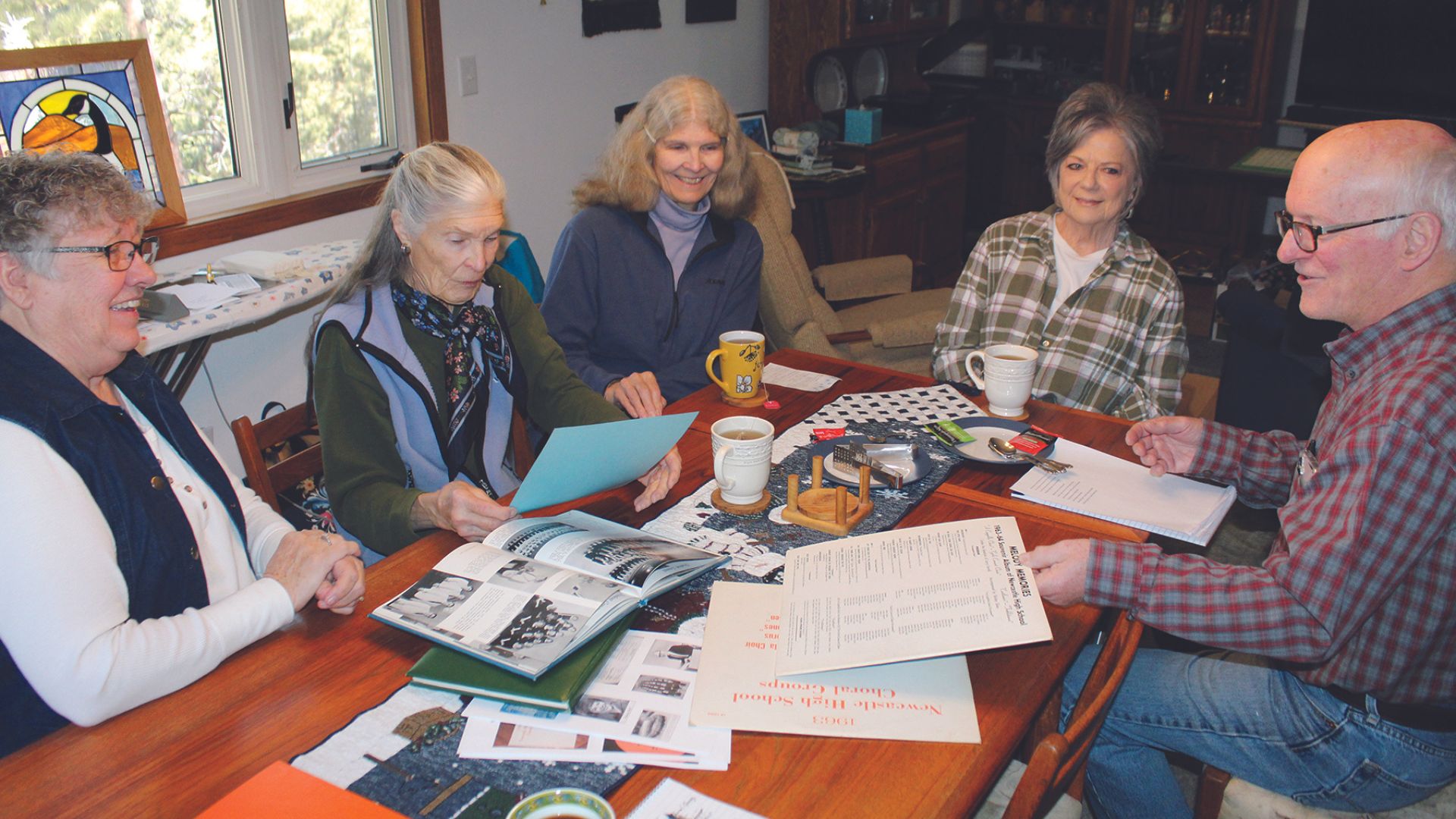Blast from the past

Photos by Walter Sprague/NLJ Members of the Newcastle High School 1963 and 1964 choral program meet at the home of Dr. Mike Jording on March 8 to listen to two records they recorded and discuss an upcoming listening party presentation with the Weston County Historical Society.
‘60s era choir albums bring back memories
The Weston County Historical Society has recently come across two record albums from the Newcastle High School 1963 and 1964 choirs. Mike Jording, a member of the board, heard the recordings a couple of months ago and immediately knew their value.
“When I listened to it, I just shuddered. What an outstanding recording,” Jording told the NLJ.
Retired NHS teacher, Delbert Blocker, brought one of the albums to Jording’s attention.
“He recognizes things of historical importance,” Jording said.
After hearing the first album, Jording said, he knew some type of action needed to be taken. Jording thought they should identify the people who were a part of this choir and get them together.
Soon Jording learned that another album was recorded at that time, but the second was hard to find. Fortunately, Barbara Crow had both albums and came forward to produce her copies. One of her records had even been signed by the choir members.
Crow is donating both of her albums to the museum, and the historical society will host a listening party on April 28 to celebrate her donation. That event will take place at 1 p.m. at Christ the King Lutheran Church in Newcastle.
“When you hear the quality of this, it just needs to be shared with the community, and recognize the students that performed,” Jording said.
Members of the choir are also excited to share their forgotten talent with the community.
“It is going to be a good program,” Crow said. “If he plays the record, everybody is going to be happy.”
She explained that the choir at the time was considered to be very good, which is why the recordings were probably made. Larry Farrel was the choir teacher at the time and was responsible for their sound.
“You didn’t have to like him — most people did — but you respected him,” Crow explained. “He knew how to bring out the best.”
In that era, the choir and band were a big deal in Newcastle, and the choir traveled to other schools to compete. Crow said that choir was the thing to do among students.
“We did fun things. We won everything,” she said. “We went to a lot of choir competitions, and we always got top rating.”
Those who knew him say that Farrel had a lot to do with the success of the group. He could be a bit harsh, but he allowed fun within the group. Students caroled around town every year at Christmas, and Farrel and his students collaborated with the community every year to put on a production of Handel’s “Messiah.”
“We just did stuff and it was exciting,” Crow recalled, “and people wanted to be in choir.”
All the practice and hard work paid off, she said, and the results showed in the talent of the students and the sound they produced. She remembers that about 80 students participated in the choir program.
“He (Farrel) inspired excellence,” Crow said. “He demanded excellence and he got it.”
Members of the choir from that era say they are excited to take the trip down memory lane, and also to share their music with the community. Those who have already heard the recording have told the NLJ how nice and interesting it has been to stumble across these recordings.
“It would be cool if the community knew that we had such a thing at one time,” Crow said.
The old records have vanished over the years, so finding these two albums is significant. Local historians claim his is why it is so important for the museum to keep these recordings and honor the history of the NHS choir.
Even the people who had the albums had no way of listening to them, so they were forgotten.
“There have been a few record albums around, but the people that had them, they just had them, and hadn’t listened (to them) in 60 years either,” Jording reasoned.
Jording got some members of the choir together at his home to listen to the albums for the first time in years, and he also reached out to another member of the choir, Pat Christensen to ask her about the albums because she sings a special solo on one of the albums.
“Mike Jording contacted me and wanted to know if I remembered doing that, and that I had sung a solo on it,” Christensen recalled. “I did remember, but I hadn’t thought about it for years and years.”
Christensen admitted that she initially felt some embarrassment listening to the albums again for the first time in so many years. However, this did not negate the pride she had in her accomplishments.
“Even 60 years ago, I was pretty proud that I was the one chosen to do that,” Christensen said. “When I heard it, I thought, ‘Wow, that’s amazing that I sounded like that.’”
After six decades, Crow said, it was an experience for those who made the album to hear their voices again.
“When you hear those records, it’s awesome,” Crow said. “I had forgotten how good it was.”
In the 1960s, women could not participate in school sports, leaving choir as one of the few extracurricular activities a girl could participate in.
“Choir was a big part of our lives. Even if we weren’t musical, it was important,” Crow said.







